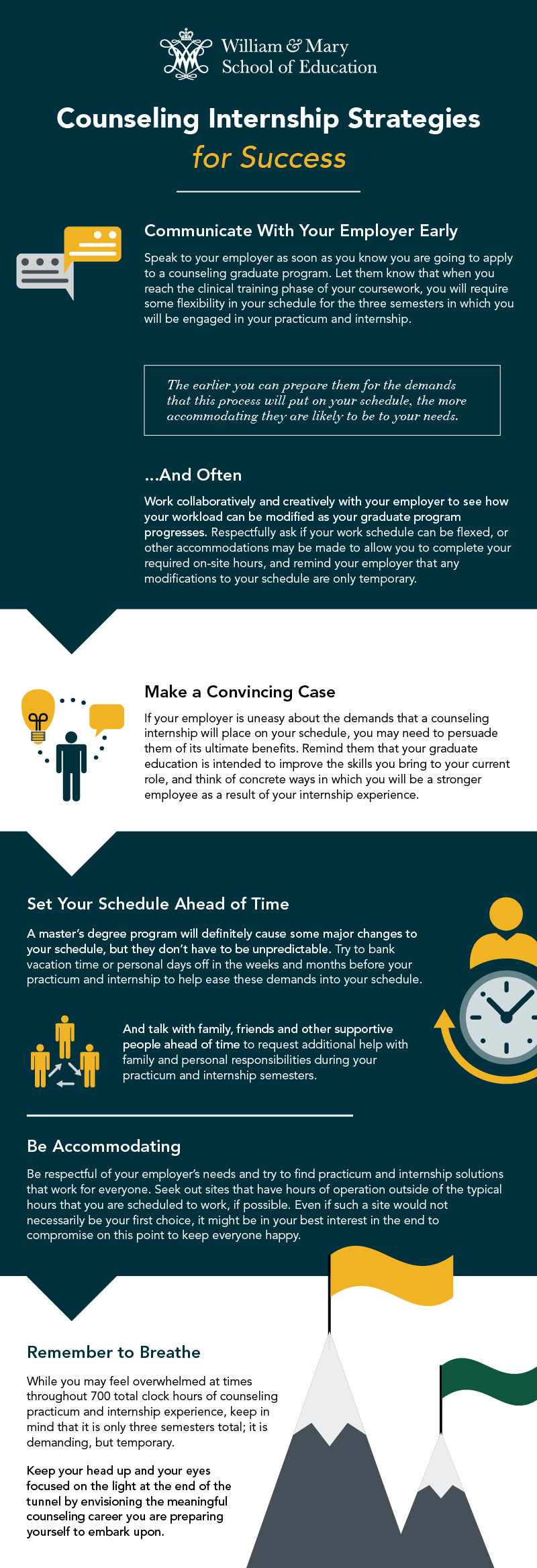As anyone who has spent any time at all working as a counselor can tell you, the skill set, competencies and demeanor necessary to succeed in the field cannot be learned in a classroom alone. All counselors—clinical mental health counselors, military and veterans counseling specialists, school counselors, or any other type—benefit immensely from hands-on, practical experience working face to face with clients.
For this reason, graduate programs in counseling that are designed to lead to professional licensure, like the Online Master of Education (M.Ed.) in Counseling from William & Mary, typically contain a substantial internship requirement. While the 100-clock-hour practicum course and the 600-clock-hour internship experience required by William & Mary’s program may seem daunting, there are some important strategies you can embrace in order to ensure your internship is successful.
Below, check out our infographic detailing tips for succeeding in a counseling internship, and prepare yourself for a meaningful, transformational experience.
1. Communicate With Your Employer Early...
Speak to your employer as soon as you know you are going to apply to a counseling graduate program. Let them know that when you reach the clinical training phase of your coursework, you will require some flexibility in your schedule for three semesters in which you will be engaged in your practicum and internship. The earlier you can prepare them for the demands that this process will put on your schedule, the more accommodating they are likely to be to your needs.
2. ...and Often
Work collaboratively and creatively with your employer to see how your workload can be modified as your graduate program progresses. Respectfully ask if your work schedule can be flexed, or other accommodations may be made to allow you to complete your required on-site hours, and don’t be shy to remind your employer that any modifications to your schedule are only temporary.
3. Make a Convincing Case
If your employer is uneasy about the demands that a counseling internship will place on your schedule, you may need to persuade them of its ultimate benefits. Remind them that your graduate education is intended to improve the skills you bring to your current role, and think of concrete ways in which you will be a stronger employee as a result of your internship experience.
4. Set Your Schedule Ahead of Time
A master’s degree program will definitely cause some major changes to your schedule, but they don’t have to be unpredictable. Try to bank vacation time or personal days off in the weeks and months before your practicum and internship to help ease these demands into your schedule. And talk with family, friends and other supportive people ahead of time to request additional help with family and personal responsibilities during your practicum and internship semesters.
5. Be Accommodating
Be respectful of your employer’s needs and try to find practicum and internship solutions that work for everyone. Seek out sites that have hours of operation outside of the typical hours that you are scheduled to work, if possible. Even if such a site would not necessarily be your first choice, it might be in your best interest in the end to compromise on this point to keep everyone happy.
6. Remember to Breathe
While you may feel overwhelmed at times throughout 700 total clock hours of counseling practicum and internship experience, keep in mind that it is only three semesters total; it is demanding, but temporary. Keep your head up and your eyes focused on the light at the end of the tunnel by envisioning the meaningful counseling career you are preparing yourself to embark upon.
Make Your Counseling Internship Count at William & Mary
At William & Mary, we believe strongly in the value of practice, experience and face-to-face interaction in our Online M.Ed. in Counseling program. Our internship requirement is vital to shaping our counseling master’s degree students into the most compassionate and effective advocates for social justice they can be.
Learn more about the innovative ways we shape our program’s online experience into one that is both meaningful and personal, including the unique Social Justice dashboard that tracks your growth as a counseling professional.


